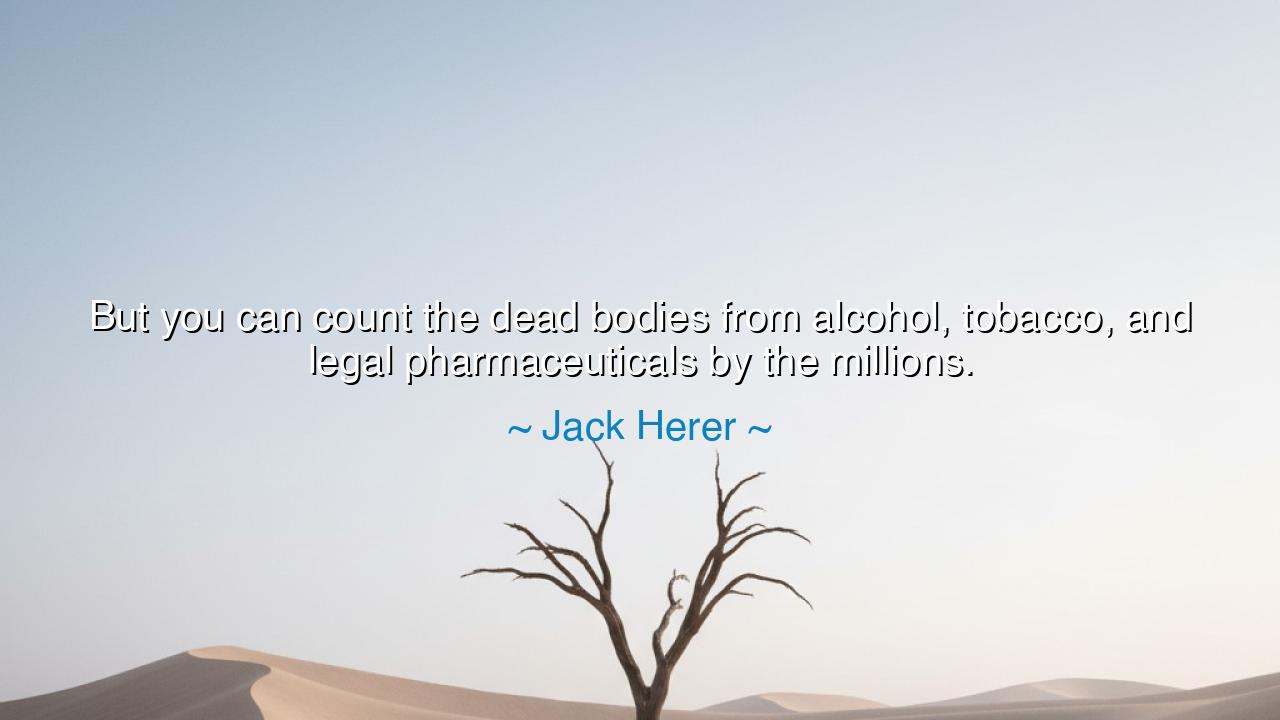
But you can count the dead bodies from alcohol, tobacco, and
But you can count the dead bodies from alcohol, tobacco, and legal pharmaceuticals by the millions.






Hear now the thunderous cry of Jack Herer: “But you can count the dead bodies from alcohol, tobacco, and legal pharmaceuticals by the millions.” This utterance, sharp as a blade and sorrowful as a funeral dirge, exposes the hypocrisy of a society that condemns some substances while sanctifying others, even as those “legal” poisons bring untold death and suffering. His words are not idle, but a reckoning—a call to see truth where deceit has long prevailed.
The meaning of this quote is plain yet piercing: though much fear and stigma are cast upon certain plants and medicines, the real slaughter comes from the substances already accepted and consumed daily. Alcohol fills graveyards with the victims of disease, violence, and accident. Tobacco blackens lungs and shortens countless lives with cancer and disease. And pharmaceuticals, though born of science and often cloaked in the language of healing, have given rise to epidemics of addiction, especially in the modern age of opioids. These are not minor tragedies, but rivers of blood that flow across the world, leaving millions dead in their wake.
History bears witness to this truth. In the 1920s, the United States tried to ban alcohol during Prohibition, declaring it the source of moral decay. Yet even before and after its prohibition, alcohol has claimed more lives than many wars—through cirrhosis, drunk driving, and violence born of intoxication. And yet, despite the carnage, it is sold openly, celebrated in festivals, and accepted as normal. Here lies the hypocrisy Jack Herer condemns: that what is familiar is excused, even when it kills by the millions.
Consider also the tobacco empires of the twentieth century. For decades, cigarette companies denied the link between smoking and cancer, even as doctors and scientists raised alarm. Their deception led to the death of millions worldwide, while their coffers swelled with gold. Only after relentless struggle did the truth become widely accepted, and yet the smoking of tobacco remains legal and widespread. Herer’s words echo here: the body count is not hidden—it can be counted in hospital beds, in urns, in graves.
And now, in our own time, the plague of prescription drugs, especially opioids, has swept across nations. Marketed as safe, prescribed in excess, these pharmaceuticals have enslaved millions in addiction, destroying families, hollowing out towns, and leaving cemeteries heavy with the young. This devastation is not from illicit crime alone, but from the very institutions meant to heal. Once again, we see the truth in Herer’s cry: the real harvest of death comes not from the criminalized, but from the legal.
The lesson is clear and urgent. We must not measure the worth of substances by the stamp of legality, but by their true impact upon human life and dignity. What is lawful is not always righteous, and what is forbidden is not always harmful. The wise discern not by the decree of governments or the profits of corporations, but by the fruits borne in the bodies and souls of men. A society that ignores this truth will continue to count its dead bodies by the millions, blind to the cause.
Practical action lies before us. Question the systems that profit from death while branding themselves as guardians of health. Demand honesty from industries and governments that allow poisons to circulate freely. Choose moderation and mindfulness in what you consume. Teach your children not only the dangers of the illegal but also the silent devastations of the accepted. And above all, strive for a society that values life above profit, truth above deception, and wisdom above hypocrisy.
Thus let Jack Herer’s words resound as both warning and prophecy: the graves of the world testify against our blindness. Until we see clearly, until we act justly, the earth will continue to be covered with the fallen—taken not by forbidden fruits, but by the legal poisons we have embraced as normal.






AAdministratorAdministrator
Welcome, honored guests. Please leave a comment, we will respond soon